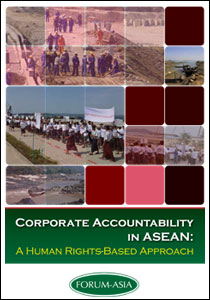Posts Tagged ‘Corporate Social Responsibility’ (4 found)
Commentary: Trade, development and the smokescreen of CSR
As states across the world have embraced the idea that markets can work for the poor, CSR has become a crucial part of a discourse which sees the primary function of government as creating an enabling environment for business. It is perhaps not surprising, then, that the present ‘transition’ of Burma – a nation of untapped consumer markets, abundant natural resources, and a comparatively cheap labour force – has CSR at its heart […]
• • •Kachin Group Slams China’s New CSR Report on Irrawaddy Dams
A Kachin group today criticized the new corporate social responsibility report on the controversial Irrawaddy dams, calling for a locally-led development process, not one benefiting only China […]
• • •Corporate Human Rights Abuses in ASEAN: Civil Society Calls for Corporate Accountability and Compliance with International Human Rights Law
Civil society groups called for greater corporate accountability in the region, which requires a regulatory framework based on international human rights norms and standards, to address the escalation of corporate human rights abuses in ASEAN, during the launch of a report, titled “Corporate Accountability in ASEAN: A Human Rights-Based Approach”, in Jakarta yesterday […]
• • •Corporate Accountability in ASEAN : A Human Rights-Based Approach
 Corporate Accountability in ASEAN: A Human Rights-Based Approach assesses the impacts of business on human rights in the ASEAN sub-region. Originating from cases presented at two public hearings organised by civil society groups in 2011 in response to the ASEAN Intergovernmental Commission on Human Rights (AICHR)’s undertaking of a thematic study on the topic of “corporate social responsibility” (CSR) in ASEAN, this report documents cases of human rights violations in relation to business activities in the sub-region, and demonstrates that voluntary CSR initiatives promoted by businesses – and by ASEAN institutions – are insufficient […]
Corporate Accountability in ASEAN: A Human Rights-Based Approach assesses the impacts of business on human rights in the ASEAN sub-region. Originating from cases presented at two public hearings organised by civil society groups in 2011 in response to the ASEAN Intergovernmental Commission on Human Rights (AICHR)’s undertaking of a thematic study on the topic of “corporate social responsibility” (CSR) in ASEAN, this report documents cases of human rights violations in relation to business activities in the sub-region, and demonstrates that voluntary CSR initiatives promoted by businesses – and by ASEAN institutions – are insufficient […]









 All posts
All posts